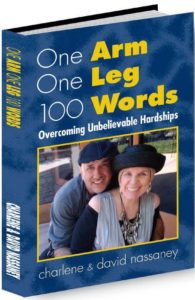
An excerpt from my book, One Arm One Leg 100 Words, Overcoming Unbelievable Hardships”
Another thing that Charlene and I both had to adjust to in the beginning of the grieving process was losing some of our freedoms. At the time, my caregiver group encouraged me to be good to myself by taking little trips away from home to get refreshed and rejuvenated. Likewise, Charlene needed to get away.
However, I am sorry to confess that I could not think of her needs more than my needs at that time, something I am not very proud to admit. I was just trying to survive, and I needed to make sure that I was okay first so that I could take care of her. Right or wrong, it was what I needed at the time. Unfortunately, she couldn’t really get the same kind of freedom that I had back in those days. I did my best, but I’m sure it wasn’t good enough. That helped contribute to her belief that I was not very nice or fair back then.
The natural tendency for a caregiver is to feel guilty when they are not taking care of the patient 24/7, thus promoting something called burnout. I have seen many caregivers burnout. It is not a pretty sight. They become bitter and resentful of the patient. Sarcasm and cynicism become a normal way of communicating to anybody who will listen. They also take on a martyr mentality. They believe that they have a thankless job, and that nobody appreciates them, most of the entire patient whom they believe is ungrateful. When that patient happens to also be your spouse, the problem is intensified many times, damaging the marital relationship. Sometimes the damage is beyond repair.
I wanted to make sure that never happened to me. I never wanted to resent my wife for her disability, so I tried to follow the advice of my caregiver group. I would take an occasional trip away from it all whenever I sensed burnout was right around the corner waiting to pounce on me. Many times my wife resented my going away without her.
Sometimes I had to be secretive about it because I knew it would hurt her if she ever found out. But I knew that if I didn’t take care of myself first, I would not be able to take care of anyone, much less the most important person in my life. I wanted our relationship to be as fresh and as strong as it possibly could.
Feeling free to come and go was very important for me. It made me appreciate my wife so much more when I returned home. You know what they say, “absence makes the heart grow fonder,” and it did. I tried to equal the score in her mind by taking her away with me somewhere special afterwards. I made every attempt to make our abnormal situation as normal as possible. The best way to do that was to simply act normal, and eventually it finally felt normal.
I remember discussing this concept with other Christians who disagreed with me. Some say that others must come first, and yourself last. They use the acronym, J.O.Y, which stands for, Jesus first, then others, then finally you. I strongly disagree with this concept. My favorite analogy for refuting this philosophy is the following story:
When you are flying on a plane, the flight attendant is required to give you a safety presentation. They begin by saying that if there is an unexpected loss in cabin pressure; oxygen masks will drop from the above compartment. If you are with a child, you are supposed to put your mask on first. Then you may help your child put on their mask. On the surface, this seems like a very selfish thing that the flight attendant is telling you to do. How could she tell you to selfishly put your mask on first, and neglect that poor little kid for whom you would gladly die?
Well that’s just the point. If you don’t put your mask on first, you may die. Then what hope would your kid have without you around anymore to help him go through life? Many people are not aware that the best way to show love doesn’t always involve just giving the recipient whatever they want. Another name for that might be enabling, or spoiling the child, which entails giving them too much and too often of anything that they didn’t earn or deserve.
True love gives the other person what they need, not necessarily what they want. This is commonly referred to as tough love. It is basic Care Giving 101, taking care of you first, so that you can take care of others that need your help.
Another more personal aspect of loss that we suffered after the stroke had to do with our intimacy in the bedroom. The right side of Charlene’s body had experienced paralysis and loss of feeling. Obviously, this would affect some areas of our romance that we enjoyed.
We had to adjust, and learn new creative ways to be intimate with each other. It was very hard, awkward, and embarrassing at first. For a time, we were sleeping in different bedrooms because of the muscle spasms that would occur in her right leg that would violently kick me in the middle of the night and wake me up.
In order to get a good night sleep, I slept in the guest room. This made it tempting and easier to consider just giving up on trying to be intimate. I remember wondering how I would ever make it, given how different things were with all that I had lost. But then I would look at Charlene, and realize that she had lost so much more than I, so how could I complain about my relatively small losses compared to her huge losses?
It just seemed like too much work at times, but thankfully neither one of us really wanted to give up on the long history of romance and intimacy that we had enjoyed all of our married lives. We continued to try and experiment for many months until we finally were both able to be intimate with each other in a different way that continued to keep us emotionally close to each other.
We finally were able to show and express our love that we had towards each other. It was difficult communicating our needs to each other, but we somehow managed to do it. We are very grateful to God for allowing our intimacy to continue to feed the great marriage God had established for us.
 This is just a another chapter of my book “One Arm One Leg 100 Words, Overcoming Unbelievable Hardships”. You can buy the book by clicking this link. And surely, you will not stop reading it from the beginning till the end of this book.
This is just a another chapter of my book “One Arm One Leg 100 Words, Overcoming Unbelievable Hardships”. You can buy the book by clicking this link. And surely, you will not stop reading it from the beginning till the end of this book.

